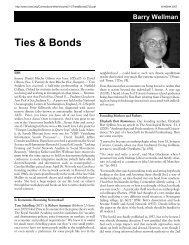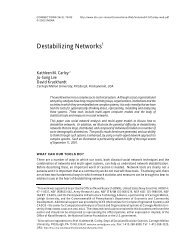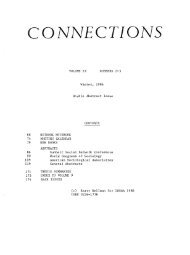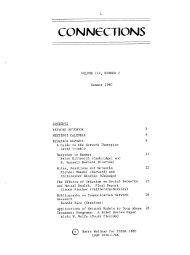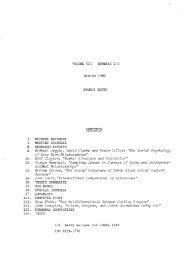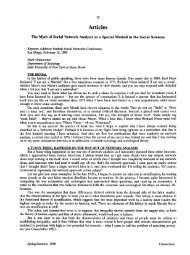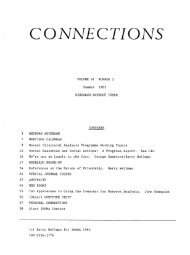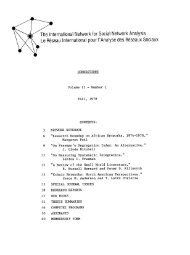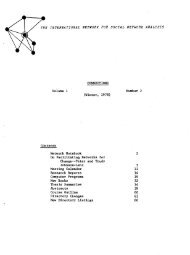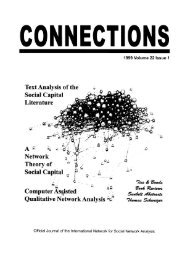(1979). Social Networks and Psychology. Connections, 2 - INSNA
(1979). Social Networks and Psychology. Connections, 2 - INSNA
(1979). Social Networks and Psychology. Connections, 2 - INSNA
Create successful ePaper yourself
Turn your PDF publications into a flip-book with our unique Google optimized e-Paper software.
- 75 -normally been intentionally established" ; obedience to a person in authority, who is subject to the sameimpersonal order as the person who obeys authority ; <strong>and</strong> the restriction of actions of comm<strong>and</strong> <strong>and</strong> obedienceto "the sphere of the rationally delimited jurisdiction" (Weber, 1968 : 217-218) . In sum, the "meaning" oflegal-rational social action is belief in the validity of a particular set of procedures for both the making<strong>and</strong> the administration of rules <strong>and</strong> policy . Given such a shared belief, it is logically consistent but notnecessary that the ideal-typical structure of bureaucracy should emerge . In fact, Weber sees several differentstructures as depending on legal-rational action, bureaucracy being the one which is "most unambiguouslya structure of domination" (1968 : 219) .5Weber reaches the high point of his methodological consistency in the construction of such intermediatelevels of organization from types of social action . This consistency primarily rests upon the logicallyderived <strong>and</strong> formally described structures which correspond to types of social action . There is no cleardirection of cause here, but an assertion of expected correlation between legal-rational action <strong>and</strong> bureaucracy,comparable to the correlation between religious <strong>and</strong> economic action mentioned above . Thus, "collegialbodies," just as bureaucracies, rest on legal-rational action . So, for that matter, does the market .What, then, is the relationship among these structures? It seems fair to say that Weber intends tocharacterize whole societies in terms of the types of social action in which their members engage . This isevident in the example of legal-rational social action, at least to the extent that the formal analysis ofbureaucratic structure implies the existence of control from the top, <strong>and</strong> a clinetele at the bottom . Givena perfectly hierarchical flow of comm<strong>and</strong>s, the method of recruitment to the top of the structure becomescrucial theoretically (1968 : 987) . Further, even given legal-rational action throughout a society, notsimply in a single bureaucracy, there are numerous alternative rational procedures for determing the personat the top of the hierarchy . In addition, bureaucracy, as opposed to other forms of organized legal-rationalaction, assumes a clinetele ; i .e ., something is administered for, or to, other actors . These actors, aswell as the officials in the bureaucracy, must at least passively accept the legitimacy of legal-rationaldomination .Weber sees the ideal-typical bureaucracy as a central institution of modern society . It is "fullydeveloped in political <strong>and</strong> ecclesiastical communities only in the modern state, <strong>and</strong> in the private economyonly in the most advanced institutions of capitalism" (1968 : 956) . More generally, "bureaucracy is themeans of transforming social action into rationally organized action" (1968 : 987) . Bureaucracy is relatedto the formation of collegial bodies, especially in the legal profession <strong>and</strong> parliament, which are alsobased on legal-rational action . Bureaucratization, as the most rational example of modern social action,is ralated to the leveling of social differences in the interests of technical efficiency <strong>and</strong> universaladministration . Finally, all of this is related to the emergence of modern capitalism (1968 : 296) .Thus, legal-rational social action results in several different, but related, ideal-typical forms :the market, bureaucracy, <strong>and</strong> collegial bodies . These forms, in turn, are composed of various factors, someor all of which have appeared independently or in various combinations in other historical circumstancesFurthermore, legal-rational social action is only one of at least three ideal-typical social actions . Any ofthese can occur in principle in different combinations ; for example, feudalism is based simultaneously on bothtraditional domination (personal fealty) <strong>and</strong> legal-rational domination (free contract) (Weber, 1968 : 255-256) .Weber (1949 : 72-73) makes this combination of factors an explicit methodological statement :The type of social science in which we are interested is an empirical science of concretereality . Our aim is the underst<strong>and</strong>ing of the characteristic uniqueness of the reality inwhich we move . We wish to underst<strong>and</strong> on the one h<strong>and</strong> the relationships <strong>and</strong> the culturalsignificance of individual events in their contemporary manifestations <strong>and</strong> on the otherthe causes of their being historically so <strong>and</strong> not otherwise . . . [It] concerns itself withthe question of the individual consequences which the working of these laws (universallyvalid causal relationships) in a unique configuration produces, since it is theseindividual configurations which are significant for us .These "configurations" are derived from an examination of all combinations of all "objective possibilities",which in turn are intermediate levels of organization based on types of social action . Weber (1949 :181-182) asserts that "the judgment of 'objective' possibility admits graduations of degree <strong>and</strong> one canform an idea of the logical relationship which is involved by looking for help in principles which areapplied in the analysis of the 'calculus of probability"' He develops this logic of analysis still furtheras a model . Just as the bias of a loaded die is established through frequent repetition, comparable, ifless reliable, methods can be used in social science :[W]e can . . . very well render generally valid judgments which assert that as a resultof certain situations, the occurrence of a type of reaction, identical in certainrespects, on the part of those persons who confront these situations, is "favored"to a more or less high degree . . . And we can . . . estimate the degree to which acertain effect is "favored" by certain "conditions" --- although we cannot do it in away which will be perfectly unambiguous or even in accordance with the precedures ofthe calculus of probability . We can, however, well enough estimate the relative"degree" to which the outcome is "favored" by the general rule by a comparison



